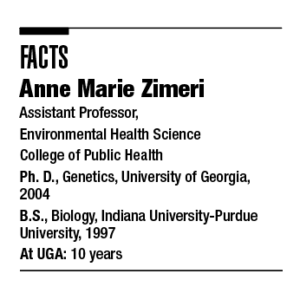In the classroom or in the field, the name of the game for assistant professor Anne Marie Zimeri’s teaching style is hands-on.
“There’s a big trend for active learning, where we try to engage students to do something, rather than sit back and listen to a lecture,” said Zimeri, who has been teaching in the environmental health science department at the College of Public Health since 2007.
By flipping the classroom, students are more involved with the lesson, with each other.
 “These students have been raised in a different time. The attention span is low. They are on their phone a lot connecting with people on social media, but I ask them to connect with each other in class so they get practice with interaction among their peers,” said Zimeri.
“These students have been raised in a different time. The attention span is low. They are on their phone a lot connecting with people on social media, but I ask them to connect with each other in class so they get practice with interaction among their peers,” said Zimeri.
A two-year fellowship at UGA’s Center for Teaching and Learning helped to develop Zimeri’s teaching strategy, and she continues to implement innovative techniques that encourage students to more deeply engage with course materials.
One activity Zimeri learned in her fellowship—an exercise to teach undergraduates to critically think about data from primary scientific literature—resulted in a publication.
Zimeri’s commitment to her student’s learning success is one reason her faculty appointment is 80 percent teaching. She teaches three classes every semester and serves as the undergraduate coordinator and the internship coordinator.
Though teaching is Zimeri’s focus now, her research interests always have involved the environment. While pursuing her doctorate in genetics at UGA, Zimeri was engineering plants to take heavy metals out of the soil.
Today, she teaches courses on bioremediation and genetic applications for environmental health to the next generation of environmental sciences. Training goes on outside of the classroom, too.
“Even though I don’t have a research appointment, I do conduct research but with the goal to provide educational experience for undergrads,” said Zimeri.
Zimeri received a $300,000 grant from the U.S. Department of Agriculture to fund the H.A.R.V.E.S.T. Initiative, a One Health study aimed at comparing food safety issues related to local organic farmers’ market produce in north Georgia to grocery store foods. Twelve undergraduate environmental health science students work with Zimeri on the project.
“I have students collecting and preparing samples and looking at data, learning about the scientific methods to give them an opportunity to see what research is all about,” said Zimeri. “For a lot of them, it’s their first experience having to be responsible for something.”
Under Zimeri’s mentorship, students analyze soil samples for the presence of persistent chlorinated pesticides and metals.
“We want to know if these contaminants are in our food and in our food system, especially in organic foods that people buy because they think they’re free of pesticides,” said Zimeri.
Through the project, students learn how to communicate professionally, run a field site and see the scientific process in motion. This type of hands-on experience is a necessary supplement to academic achievement if students want to be competitive as future job or graduate school candidates, said Zimeri.
In May, Zimeri received the 2017 College of Public Health’s Excellence in Teaching Faculty Award, further acknowledging Zimeri’s commitment to her students. But, said Zimeri, the benefits go both ways.
“I love the age range of undergraduates. This major attracts curious students who want to learn and want to get the most out of their classes,” she said. “And they teach me things, too. They’re always reading and sending me articles, so I’m a lifetime learner just from interacting with them.”


